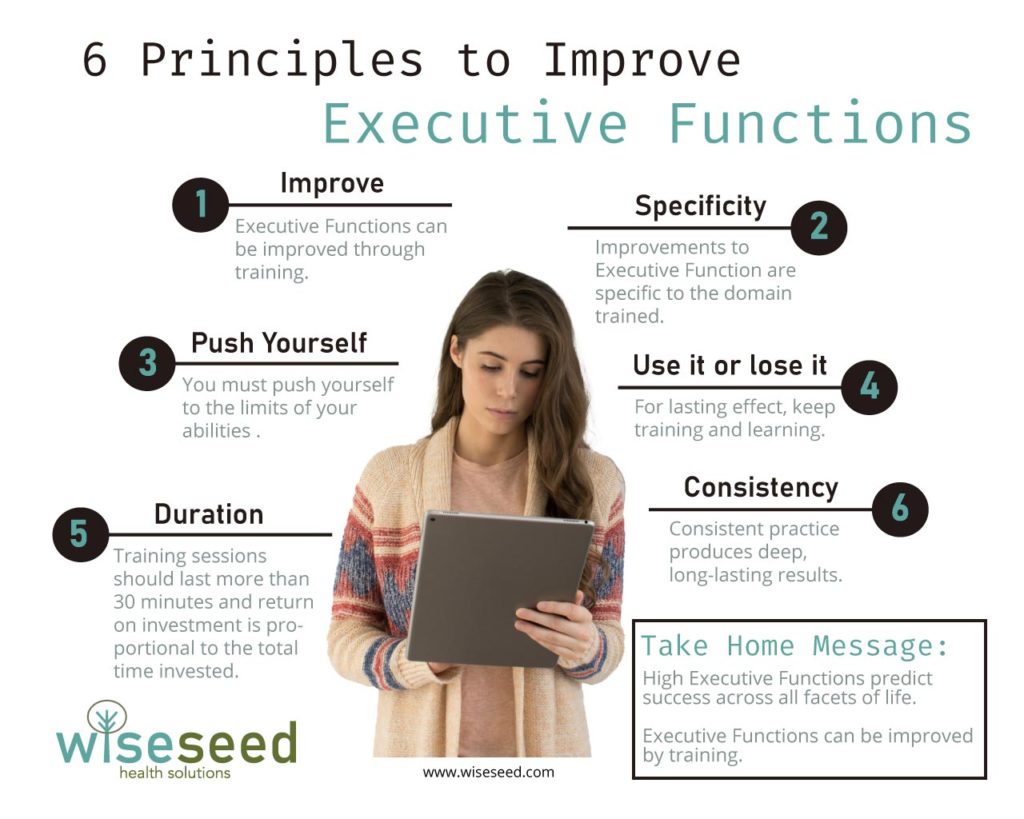How to Improve Cognitive Functions

Introduction
Why do some people succeed? One important component of success is intelligence. When people think about intelligence, they generally mean intelligence quotient (IQ). And there is no doubt that high IQ is a strong predictor of success in life (1).
In contrast, executive functions are less frequently discussed than IQ. Nevertheless, high executive functions are also a strong predictor of life success, perhaps even more so than high IQ (2). In fact, research conducted over the last decade has revealed that having high executive function predicts the following life outcomes (reviewed in (2, 3)):
– School readiness
– Academic success from primary school through to University
– Career success
– Financial stability
– Marital harmony
– Maintaining friendships
– Maintaining good Health
– A high quality of life
– A long life
What are Executive Functions?
Executive functions (EF) are a group of three fundamental processes that work together to support higher-order cognitive functions such as reasoning, problem solving and planning (2).
1. Inhibitory Control
Inhibitory control includes self-control and focused attention. It is inhibitory control that allows you to choose how to behave, as opposed to being a mindless zombie blindly following instinct.
Self-control regulates your behaviour and emotions in the service of achieving specific goals. Examples of self-control include resisting temptation and stifling your first instinctive response. It is self-control that allows you to make responses that are strategic and considered.
In contrast, focused attention is the ability to concentrate on what is important while ignoring distractions. This is what allows you focus on the task at hand despite the presence of interfering thoughts, memories, and external distractions.
2. Working Memory
Working memory is a specific type of memory that allows you to hold information in your mind and work with it at the same time. Examples of using working memory include planning a route while travelling, changing the order of a to-do list, or holding a question in mind while continuing to follow a conversation.
It is working memory that allows you to make sense of events occurring in time, because it is your working memory that remembers what happened earlier and compares it to what occurs later. Further, it is working memory that supports your ability to solve complex problems by allowing you to explore interesting relationships between remembered facts and rearrange stored information into new and useful combinations.
3. Cognitive Flexibility
Cognitive flexibility underpins your ability to adapt to change, take advantage of new opportunities, and cope with unexpected setbacks. It is cognitive flexibility that is the foundation of problem solving and creativity.
Cognitive flexibility allows you to see a problem from different perspectives. It is what lets you to ‘think outside the box’ and develop new ways of viewing a problem and invent original approaches to solve a problem.
Established Principles for Training Executive Function
Maintaining and improving executive functions is important for several reasons. As we outlined in an earlier article, executive functions begin to deteriorate in early adulthood (2-4). In fact, poor working memory and attention are among the most common complaints of older adults (2). Improving executive functions will help older adults remain active and productive throughout their life.
Strikingly, executive function can also be improved in young children (2). This is important, because children raised in disadvantaged environments tend to have lower executive functions than their more advantaged peers (2, 5). Implementing effective, low-cost executive function training in public and private schools is a viable approach to improve life outcomes for disadvantaged children (2).
Principle 1: Executive functions can be improved through training.
There are now multiple studies showing that young children through to older adults can improve their executive functions through training, although to what degree remains an open question (2).
Principle 2: The effects of training executive functions are highly specific to the skill trained.
However, the benefits to training executive function appear to be specific to the domain trained (2). Further, these skills are only transferable to other tasks where the EF skills are almost identical to what you practised (2).
To address this limitation, effective EF training modalities should target Inhibitory Control, Working Memory and Cognitive Flexibility at the same time (2).
Principle 3: You have to train at your limits to make progress.
To see continued progress, you must continually push yourself and train executive functions at the outer limits of your abilities and comfort zones (2). This region, called the ‘zone of proximal development’ (6), is where the magic happens.
Principle 4: Use it or lose it.
Although improvements in executive function can last for months, the effects of executive function training degrade over time. The gains in executive function will only last while you keep doing the work (2).
Principle 5: The gains in executive function are proportional to your investment in training time.
The gains in executive function are generally proportional to the total time invested in training. Training blocks of longer duration, for example months as opposed to weeks, generally produce better results than short duration training (2).
Furthermore, the amount of time (dose) spent in each training sessions matters. Individual training sessions of greater than 30 are better at improving executive functions than shorter training sessions (2).
Principle 6: Consistency.
Consistency matters. Shorter practice sessions, spaced out regularly over time, produce improvements in performance that are deeper and longer lasting than shorter, more intense training blocks (2).
Conclusion
The primary purpose of this article is to drive home one important point: your executive functions can be improved with training (2). The latest research suggests that by improving your executive functions through training, you become more resilient and increase your chance of living a meaningful life.

References and Further Reading
1. J. Fitzgerald, D. W. Morris, G. Donohoe, Cognitive Genomics: Recent Advances and Current Challenges. Current Psychiatry Reports 22, 2-2 (2020).
2. A. Diamond, D. S. Ling, Review of the evidence on, and fundamental questions about, efforts to improve executive functions, including working memory. Cognitive and working memory training: Perspectives from psychology, neuroscience, and human development, 143 (2019).
3. T. Salthouse, Consequences of age-related cognitive declines. Annu Rev Psychol 63, 201-226 (2012).
4. C. N. Harada, M. C. Natelson Love, K. L. Triebel, Normal cognitive aging. Clin Geriatr Med 29, 737-752 (2013).
5. T. E. Moffitt et al., A gradient of childhood self-control predicts health, wealth, and public safety. Proceedings of the national Academy of Sciences 108, 2693-2698 (2011).
6. L. S. Vygotsky, Mind in society: The development of higher psychological processes. (Harvard university press, 1980).
Acknowledgements
We thank Andrea Piaquadio and Thought Catalogue for the images used in this article.
This article was inspired by the recent landmark review on training executive function written by Dr Adele Diamond and Dr Daphne Ling (2).
Disclaimer
The material displayed on this website is provided without any guarantees, conditions or warranties as to its accuracy.
Information written and expressed on this website is for education purposes and interest only. It is not intended to replace advice from your medical or healthcare professional.
You are encouraged to make your own health care choices based on your own research and in conjunction with your qualified practitioner.
The information provided on this website is not intended to provide a diagnosis, treatment or cure for any diseases. You should seek medical attention before undertaking any diet, exercise, other health program or other procedure described on this website.
To the fullest extent permitted by law we hereby expressly exclude all warranties and other terms which might otherwise be implied by statute, common law or the law of equity and must not be liable for any damages whatsoever, including but without limitation to any direct, indirect, special, consequential, punitive or incidental damages, or damages for loss of use, profits, data or other intangibles, damage to goodwill or reputation, injury or death, or the cost of procurement of substitute goods and services, arising out of or related to the use, inability to use, performance or failures of this website or any linked sites and any materials or information posted on those sites, irrespective of whether such damages were foreseeable or arise in contract, tort, equity, restitution, by statute, at common law or otherwise.

Ten Minutes is All You Need
Research has shown that ten minutes of moderate-to-vigorous exercise performed each day is enough to significantly reduce your risk of early death.

Ten Minutes is All You Need
Research has shown that ten minutes of moderate-to-vigorous exercise performed each day is enough to significantly reduce your risk of early death.


